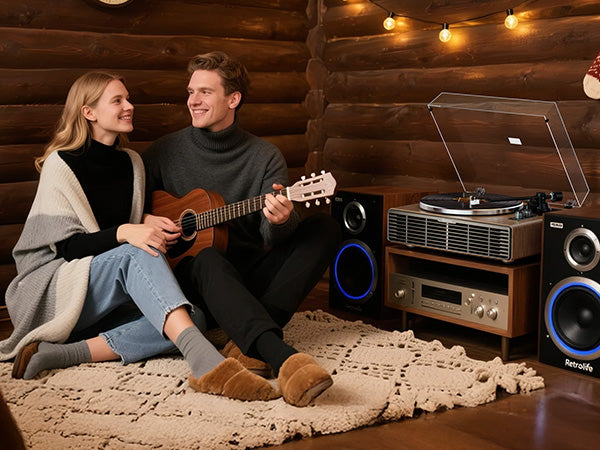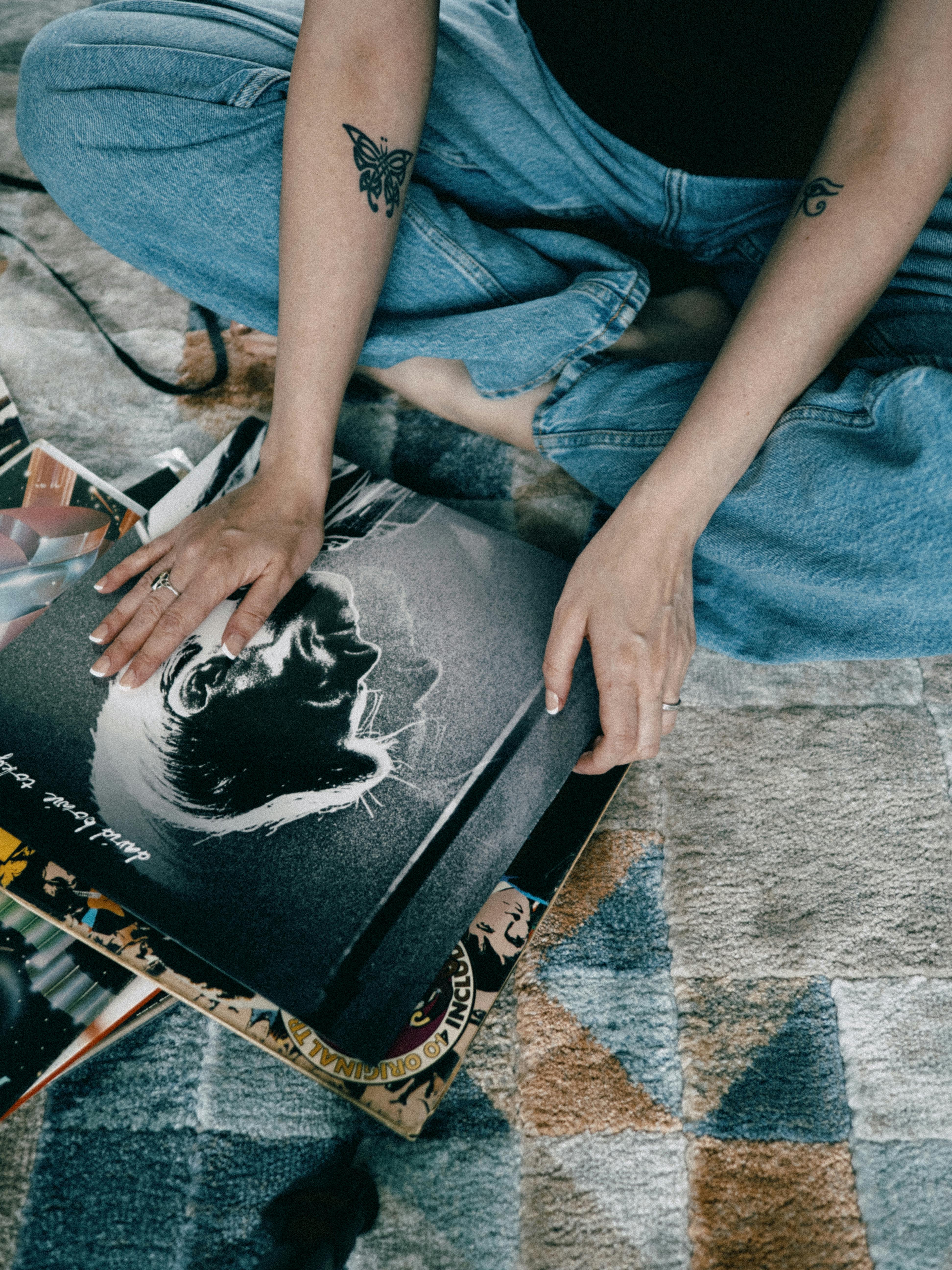In an age dominated by streaming playlists and instant gratification, the resurgence of vinyl records offers more than just a nostalgic escape—it’s becoming a powerful tool for mental health and mindfulness. The tactile ritual of spinning a record, from selecting an album to dropping the needle, invites a slower, more intentional engagement with music that can reduce stress, enhance focus, and foster emotional well-being. As vinyl sales continue to climb in 2025, with over 40 million units sold annually in the U.S. alone, listeners are discovering that this analog experience is not just about sound—it’s about finding calm in a chaotic world. Here’s how spinning records can boost mindfulness and support mental health.

The Ritual of Vinyl: A Mindful Practice
Mindfulness, at its core, is about being fully present in the moment, and few activities embody this as naturally as playing a vinyl record. Unlike tapping a screen to stream a song, spinning a record is a multi-sensory ritual that demands attention and care. The process—choosing an album from a shelf, sliding it from its sleeve, inspecting the disc for dust, and gently placing the needle—anchors you in the present moment. This deliberate pace contrasts sharply with the frenetic multitasking of modern life, offering a rare opportunity to slow down.
Psychologists note that structured rituals can reduce anxiety by providing a sense of control and predictability. For vinyl enthusiasts, handling records becomes a meditative practice. “It’s like a ceremony,” says Dr. Emily Chen, a clinical psychologist specializing in mindfulness-based therapies. “The physicality of vinyl engages your senses, pulling you away from digital overload and into a focused, calming routine.” Whether it’s flipping through a collection to find the perfect mood or cleaning a record with a brush, these small actions create a mindful pause, helping listeners disconnect from stress.
Music and Emotion: The Vinyl Connection
Music has long been recognized as a therapeutic tool for mental health, capable of regulating emotions and reducing symptoms of anxiety and depression. Vinyl records amplify this effect by encouraging deeper listening. Unlike streaming, where songs are often skipped or played in the background, vinyl demands commitment—you’re less likely to lift the needle mid-song. This fosters active listening, a key component of mindfulness, where you fully immerse yourself in the music’s textures, lyrics, and dynamics.
The warm, analog sound of vinyl also enhances emotional resonance. Studies suggest that imperfections in analog audio, such as subtle pops, hisses, or harmonic richness, can evoke a more “human” feel than sterile digital tracks, thereby creating a stronger connection to the music. For genres like jazz, classical, or indie folk, where nuance is key, vinyl’s sonic depth can evoke a sense of nostalgia or comfort, soothing the mind. Albums like Norah Jones’ Come Away With Me or Miles Davis’ Kind of Blue, often cited by vinyl fans, become emotional anchors, offering solace during tough times.
Building a Mindful Environment
Spinning records also transforms your physical space into a mindful environment. Setting up a turntable, arranging speakers, and curating a record collection creates a dedicated listening area—a sanctuary from the outside world. This intentional space encourages relaxation, much like a yoga studio or meditation corner. For many, the act of sitting down to listen to a full album, free from phone notifications, mirrors the principles of a mindfulness meditation session.
Vinyl’s physicality further enhances this environment. Handling album artwork, reading liner notes, or admiring a gatefold sleeve engages the senses in a way digital playlists can’t. These tactile elements ground you in the moment, reinforcing a sense of presence. “When I play a record, I’m not just hearing music—I’m holding a piece of art,” says Sarah Lopez, a vinyl collector from Chicago. “It feels like I’m honoring the music and myself by giving it my full attention.”

Community and Connection
Beyond individual practice, vinyl fosters social connection, another pillar of mental health. Record stores, vinyl fairs, and listening parties serve as hubs for like-minded enthusiasts to share their discoveries and stories. In 2025, events like Record Store Day draw thousands, creating communities where collectors swap tips on finding rare pressings or debate the merits of mono versus stereo. These interactions combat loneliness, a growing mental health concern, by building bonds over a shared passion.
Online platforms like Discogs and Reddit’s r/vinyl also offer virtual communities where fans discuss everything from turntable maintenance to the benefits of mindfulness. For those in underground scenes—such as punk, electronic, or lo-fi indie—vinyl becomes a badge of identity, connecting them to niche subcultures. These connections, whether in-person or digital, provide a sense of belonging that can alleviate feelings of isolation.
Scientific Backing: Vinyl’s Impact on the Brain
Research supports the link between vinyl listening and mental health. A 2023 study in Frontiers in Psychology found that engaging with physical music formats, like vinyl, activates the brain’s reward centers more than streaming, due to the tactile and anticipatory nature of the experience. The act of waiting for a record to play—watching the needle settle into the groove—triggers the release of dopamine, which enhances mood and motivation.
Vinyl’s fixed duration (approximately 20-25 minutes per side) also aligns with mindfulness practices, such as the Pomodoro technique, where focused intervals boost productivity and calm. Listening to a whole album side without interruption is akin to a guided meditation, helping listeners stay present. Additionally, the absence of algorithms dictating the next song allows for a curated, intentional experience, reducing the cognitive overload often associated with streaming platforms.
Practical Tips for Mindful Vinyl Listening
To maximize the mindfulness benefits of spinning records, consider these tips:
-
Create a Ritual: Set aside time to play a record without distractions. Turn off your phone, dim the lights, and treat the experience as a mini-meditation.
-
Choose Intentionally: Pick an album that matches your mood or challenges you to listen deeply. For relaxation, try ambient records like Brian Eno’s Music for Airports; for emotional release, opt for something raw like Billie Eilish’s When We All Fall Asleep, Where Do We Go?.
-
Engage Your Senses: Handle the record carefully, study the artwork, and notice the sound of the needle dropping onto the record. These small acts deepen your presence.
-
Limit Multitasking: Resist the urge to scroll social media or work while listening. Let the music be your sole focus.
-
Connect with Others: Visit a record store, join a vinyl club, or host a listening party to share the experience and foster a sense of community.
Challenges and Considerations
While vinyl offers mental health benefits, it’s not without challenges. The cost of records and equipment can be a barrier, with new LPs averaging $25-$40 and quality turntables starting at $200. For those on a budget, second-hand shops or library vinyl collections can be affordable entry points. Additionally, the time commitment required for vinyl listening may not suit everyone, especially those with busy schedules. However, even 20 minutes with a record can yield mindfulness benefits, making it accessible for most.
Some critics argue that vinyl’s appeal is purely nostalgic, with no tangible mental health advantage over digital music. Yet, the growing body of research and anecdotal evidence from collectors suggests otherwise—the physical and intentional nature of vinyl creates a unique space for reflection and calm.
The vinyl renaissance of 2025 is more than a trend—it’s a gateway to mindfulness and mental health. Spinning records invites us to slow down, engage our senses, and profoundly reconnect with music. From the meditative ritual of handling a record to the emotional depth of analog sound, vinyl offers a respite from digital noise and a path to presence. Whether you’re a seasoned collector or a curious newcomer, dropping the needle on a favorite album can be a small act of self-care, grounding you in the moment and lifting your spirits. So, dust off that turntable, pick a record, and let the music guide you to a calmer, more mindful state.





Leave a comment
All comments are moderated before being published.
This site is protected by hCaptcha and the hCaptcha Privacy Policy and Terms of Service apply.